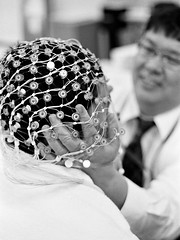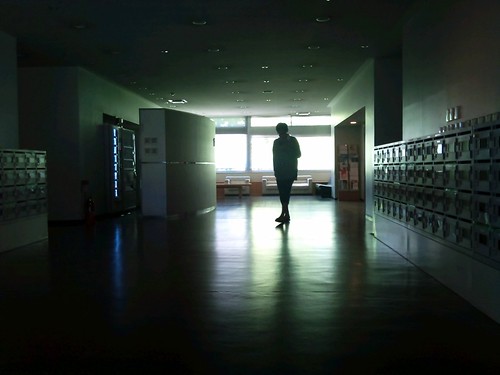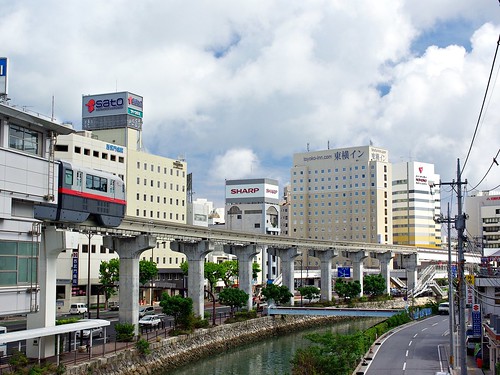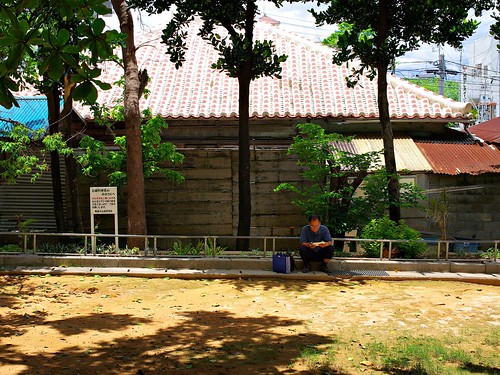A total of seven power utilities in Japan have ordered their employees to attend public nuclear power-related hearings and symposia and pose as private citizens in favour of nuclear power, some of them even asking questions prepared in advance by the utilities.
Good thing Japan has a nuclear safety agency right? One that has oversight over power companies; an agency that is ready and willing to come down hard on this kind of manipulation? Not quite. At least two of the power companies now say the safety agency asked them to subvert these hearings. The nuclear safety agency is all about the safety of the nuclear power generation business, not about the safety for the people living near the power plants.
It's a perfect example of what I've been harping about here lately: government agencies and ministries see themselves as protecting industry from the public, not protecting the public from industry.
Now imagine the same kind of behaviour in other fields: a food safety agency that protects the food and agriculture industry from the effect of tainted foods; an environmental agency that ensures environmental concerns won't stop industrial development or waste dumping; a drug safety agency that keeps local drug companies safe from competition at the expense of effective, inexpensive treatments available elsewhere; police and prosecutors that are willing to plant evidence and send innocents to prison in order to protect a corrupt colleague, or simply to further their own careers.
Every country, every society, has its share of problems. The unchecked, unaccountable power wielded — sometimes abusively, sometimes wisely, but always without oversight — by public ministries and industrial groups is one of the main problems in Japan today.
Saturday, July 30, 2011
Friday, July 29, 2011
Who's Next in the DPJ? Who Cares?
I'm finally seeing the end of a marathon paper writing process — not the end, mind you, but at least there is an end in sight.
Meanwhile, Shisaku is speculating about the next prime minister once Kan leaves office sometime within the next couple of months. I wonder why he bothers. As he points out himself, it doesn't matter who gets appointed as the other major parties are all obstructing any and all possible legislation with the sole aim of forcing a new general election. Largest opposition LDP is fully prepared to vote against their own proposals if the DPJ supports them, that's how bad it is.
That general election won't happen any time soon. The prime minister decides when to hold it, and as the DPJ is certain to get badly beaten, no DPJ leader with aspirations to any kind of political future is going to call it until they absolutely have to, in 2013. Up until then Japan will continue in a state of political deadlock.
And things are very unlikely to improve after the next election. Both the LDP and the DPJ have amply demonstrated that even majority rule is not enough. They are often unable to actually impose any legislation contrary to the wishes of the state ministries and the large industrial and professional lobby groups. Power company executives have been openly mocking the idea of tougher regulations or government oversight; they know an administration can't do it without consent from ministries that see their job as protecting the industry1, not regulating it.
The stasis will continue, in some form or another. The economy and peoples' lives will suffer for it. Those elected by the public will largely be unable to do anything significant about it, while the unelected power brokers obviously do not care. I'm afraid that things may have to become a lot worse before it ever gets better again.
--
Meanwhile, Shisaku is speculating about the next prime minister once Kan leaves office sometime within the next couple of months. I wonder why he bothers. As he points out himself, it doesn't matter who gets appointed as the other major parties are all obstructing any and all possible legislation with the sole aim of forcing a new general election. Largest opposition LDP is fully prepared to vote against their own proposals if the DPJ supports them, that's how bad it is.
That general election won't happen any time soon. The prime minister decides when to hold it, and as the DPJ is certain to get badly beaten, no DPJ leader with aspirations to any kind of political future is going to call it until they absolutely have to, in 2013. Up until then Japan will continue in a state of political deadlock.
And things are very unlikely to improve after the next election. Both the LDP and the DPJ have amply demonstrated that even majority rule is not enough. They are often unable to actually impose any legislation contrary to the wishes of the state ministries and the large industrial and professional lobby groups. Power company executives have been openly mocking the idea of tougher regulations or government oversight; they know an administration can't do it without consent from ministries that see their job as protecting the industry1, not regulating it.
The stasis will continue, in some form or another. The economy and peoples' lives will suffer for it. Those elected by the public will largely be unable to do anything significant about it, while the unelected power brokers obviously do not care. I'm afraid that things may have to become a lot worse before it ever gets better again.
--
#1 and their own extremely well-paid post-retirement jobs in said industries.
Monday, July 25, 2011
Firefox 5
I upgraded my web browser to Firefox 5 the other day, from version 3.6. The whole process was very uneventful, in a good way. For older versions of Ubuntu there's a PPA (a special repository) for recent Firefox releases (the current version of Ubuntu has Firefox 5 already), and upgrading was as easy as adding the PPA, do an upgrade then restart the browser. I'm sure it's just as easy for OSX and Windows.
The browser seems to work flawlessly. My plugins, including the all-important Zotero plugin, were all compatible with the new version, and all websites work as expected. The most obvious change is visual; the interface and the theme is cleaner and tighter, with small tweaks and improvements all over the place. The browser is also noticeably snappier, and loading time in particular seems to have been improved. I don't think it uses less memory than before, but it seems better at giving back unused memory again. It's difficult to judge properly from casual use, though.
The Awesome Bar is one of the best Firefox features, yet one of the most overlooked. Firefox 5 seems to have tweaked and polished it, making it even better than before. It took me a long time to try it out, but once I did, I got hooked. I rely on the Awesome bar all the time1, and use it more than my bookmarks toolbar.
Say I want to go to my Flickr account. Instead of having to use the mouse to find the link in all my bookmarks (like many people I have hundreds and hundreds of them), I simply go to the location bar (ctrl-l is a useful shortcut) and start typing "f", "l", "i". Immediately I get a drop-down list with web pages that could match, both in the title and the contents of the web page. The list is based on places I visit, and the top results are those I visit often and that I've visited recently. And true enough, just writing "f" is enough for me to get my picture stream as the first choice, my Flickr home page as the second and updates to my Flickr groups as the third. Perfect!
The "app tab" is a very useful addition to Firefox 5. If you have a site you keep visiting all the time — Gmail, Google+, Twitter, Facebook or some site like that — You can right-click and "pin" the tab. It'll sit as a small iconified tab on the left edge of your tab bar. It's always available, and any link to another website will open in a new tab rather than replacing the pinned tab. The icon is supposed to change color whenever the web page changes2, but this doesn't work reliably for me; Google Reader updates, but Gmail only updates sometimes and Google+ does not update at all. I hope they improve the change detection in the next release, along with an option to disable the notification. Another minor issue is that the tabs only appear in the first window tab bar. If you open another window the app tabs are nowhere to be found. It'd be nice if they were persistent across all windows.
The one real disappointment is "tab groups". It sounds like a neat idea: group tabs that belong together — tabs related to a given project, for instance — and deal with them as one group. Unfortunately the user interface seems completely broken. It's still incomprehensible to me even after reading the documentation and the online help. The groups are hard to find; tabs don't stay in groups; tab groups disappear; new tabs get silently added for unknown reasons; and there seems to be no way to not be in a tab group once you start using them. It's frustrating and counterintuitive. For Firefox 5 I'd suggest you simply stay away from tab groups completely.
Other than these new bits — one positive, one negative — it really works just like the older version, except faster and neater. This is a good thing. A browser is an indispensable part of the desktop by now, and you really don't want any surprises. Browsers should Just Work, and Firefox 5 manages to do exactly that.
--
The browser seems to work flawlessly. My plugins, including the all-important Zotero plugin, were all compatible with the new version, and all websites work as expected. The most obvious change is visual; the interface and the theme is cleaner and tighter, with small tweaks and improvements all over the place. The browser is also noticeably snappier, and loading time in particular seems to have been improved. I don't think it uses less memory than before, but it seems better at giving back unused memory again. It's difficult to judge properly from casual use, though.
The Awesome Bar is one of the best Firefox features, yet one of the most overlooked. Firefox 5 seems to have tweaked and polished it, making it even better than before. It took me a long time to try it out, but once I did, I got hooked. I rely on the Awesome bar all the time1, and use it more than my bookmarks toolbar.
Say I want to go to my Flickr account. Instead of having to use the mouse to find the link in all my bookmarks (like many people I have hundreds and hundreds of them), I simply go to the location bar (ctrl-l is a useful shortcut) and start typing "f", "l", "i". Immediately I get a drop-down list with web pages that could match, both in the title and the contents of the web page. The list is based on places I visit, and the top results are those I visit often and that I've visited recently. And true enough, just writing "f" is enough for me to get my picture stream as the first choice, my Flickr home page as the second and updates to my Flickr groups as the third. Perfect!
The "app tab" is a very useful addition to Firefox 5. If you have a site you keep visiting all the time — Gmail, Google+, Twitter, Facebook or some site like that — You can right-click and "pin" the tab. It'll sit as a small iconified tab on the left edge of your tab bar. It's always available, and any link to another website will open in a new tab rather than replacing the pinned tab. The icon is supposed to change color whenever the web page changes2, but this doesn't work reliably for me; Google Reader updates, but Gmail only updates sometimes and Google+ does not update at all. I hope they improve the change detection in the next release, along with an option to disable the notification. Another minor issue is that the tabs only appear in the first window tab bar. If you open another window the app tabs are nowhere to be found. It'd be nice if they were persistent across all windows.
The one real disappointment is "tab groups". It sounds like a neat idea: group tabs that belong together — tabs related to a given project, for instance — and deal with them as one group. Unfortunately the user interface seems completely broken. It's still incomprehensible to me even after reading the documentation and the online help. The groups are hard to find; tabs don't stay in groups; tab groups disappear; new tabs get silently added for unknown reasons; and there seems to be no way to not be in a tab group once you start using them. It's frustrating and counterintuitive. For Firefox 5 I'd suggest you simply stay away from tab groups completely.
Other than these new bits — one positive, one negative — it really works just like the older version, except faster and neater. This is a good thing. A browser is an indispensable part of the desktop by now, and you really don't want any surprises. Browsers should Just Work, and Firefox 5 manages to do exactly that.
--
#1 Linux has a similar desktop application called Gnome Do. It's just as useful, and I use that one all the time too. Do and Awesome Bar are not just useful — using them reduces my mouse and trackpad use too, something my wrists are very happy for.
#2 This may or may not be a good thing, depending on your tolerance to interruptions.
Wednesday, July 20, 2011
Hauser Resigns After Research Fraud
Marc Hauser has resigned from Harvard, following the discovery that he falsified experimental data in at least three papers. He is going to work "on the educational needs of at-risk teenagers" (which is really laying it on with a trowel; couldn't he just "want to spend more time with his family" or something?)
Why would a lauded, even lionized researcher of such stature commit fraud? Only he knows, of course, but I suspect his towering status has more than a little to do with it. Author of multiple books, leader of his own lab in one of the most prestigious research places in the world, greeted as a celebrity wherever he goes, half his own staff and students seeing him as a hero - the pressure to perform, to keep getting results, must have been immense. No matter what, he is still only a fallible human, and asking him to be superhuman, to be perfect, is not realistic and not fair.
Very few people are born cheaters. The vast majority of researchers enter their field because they genuinely want to understand the world around them, and share their finds with the world. If money and fame is your goal then science is not the right field for you. I doubt most cheaters start by outright, large-scale fraud, and I doubt Hauser did either.
But I imagine that when failure is no longer an option - when your career, your status, your own livelihood and the future careers of people under your charge all depend on your success - people will all too often start down a slippery slope: clean up a fuzzy picture just a little, omit those obvious outliers, perhaps rerun an experiment that just failed to reach significance. The pressure doesn't let up, and once you've started it's easy to take just another small step, and another... One day you wake up and realize you've become something you used to despise.
How to stop this? We can't stop hero-worshipping, and research funding agencies understandably want to support successful research over failures. It's one thing to tell people that it's OK to fail, but the reality is that a failed project is a real handicap when funding is as cut-throat as it is today. Better oversight and a culture of transparency would help - it should always be OK to talk about odd events or suspicious data in your lab, and a whistleblower should ideally be able to count of the full support of their university. Reminding people what is and is not good research practice throughout their training is another good idea; almost all people want to do things correctly, so you want to stop them from entering that slippery slope before they even realize it.
Why would a lauded, even lionized researcher of such stature commit fraud? Only he knows, of course, but I suspect his towering status has more than a little to do with it. Author of multiple books, leader of his own lab in one of the most prestigious research places in the world, greeted as a celebrity wherever he goes, half his own staff and students seeing him as a hero - the pressure to perform, to keep getting results, must have been immense. No matter what, he is still only a fallible human, and asking him to be superhuman, to be perfect, is not realistic and not fair.
Very few people are born cheaters. The vast majority of researchers enter their field because they genuinely want to understand the world around them, and share their finds with the world. If money and fame is your goal then science is not the right field for you. I doubt most cheaters start by outright, large-scale fraud, and I doubt Hauser did either.
But I imagine that when failure is no longer an option - when your career, your status, your own livelihood and the future careers of people under your charge all depend on your success - people will all too often start down a slippery slope: clean up a fuzzy picture just a little, omit those obvious outliers, perhaps rerun an experiment that just failed to reach significance. The pressure doesn't let up, and once you've started it's easy to take just another small step, and another... One day you wake up and realize you've become something you used to despise.
How to stop this? We can't stop hero-worshipping, and research funding agencies understandably want to support successful research over failures. It's one thing to tell people that it's OK to fail, but the reality is that a failed project is a real handicap when funding is as cut-throat as it is today. Better oversight and a culture of transparency would help - it should always be OK to talk about odd events or suspicious data in your lab, and a whistleblower should ideally be able to count of the full support of their university. Reminding people what is and is not good research practice throughout their training is another good idea; almost all people want to do things correctly, so you want to stop them from entering that slippery slope before they even realize it.
As for Hauser himself? He may or may not return to academia in some years. But with this resignation - and the lingering doubt of all his earlier publications; he is unlikely to have started with full-blown fraud - I don't expect him to ever return to active, high-profile research ever again.
Monday, July 18, 2011
#6
The hot, sunny weather we've had lately suddenly turned rainy and cool (well, not quite as hot is more like it). The reason? Typhoon #6. We rarely get typhoons here in Osaka - the city is well sheltered - but this one seems determined to hit us straight on. Should arrive here around Wednesday. Now, it's unlikely to actually pass straight over the city as Shikoku should deflect the center out towards the sea, but it'll be close enough for some rough weather.
Let's just hope the trains don't stop; I like my current job well enough, but not so much I want to spend the night sleeping under my desk.
Let's just hope the trains don't stop; I like my current job well enough, but not so much I want to spend the night sleeping under my desk.
Saturday, July 16, 2011
Don't Wait Up for the Singularity
Ever hear about "the singularity"? It's the vague idea that technological advancement and machine intelligence is exponential, and will completely overwhelm humanity. One part of that is the sci-fi idea that we'll be able to analyse and copy the exact brain pattern of an individual, then have them live on as potentially immortal simulations, perhaps with robotic bodies to interact with the real world. Standard science fiction fare, but some people believe this is a real possibility.
In this piece, David Linden argues that while it is conceptually possible to actually copy somebody's mind, the proponents are very wrong on just how difficult it is, and how much time it will take before we'd be able to actually do this.
As a computational neuroscientist (well, sort of at least), I agree with pretty much every word he says. We are a product of our brains, situated in the world, and if you were able to do a faithful functional copy of the mind and of the world you'd be able to live on. No ghost in the machine is necessary. However, we are very, very far from being able to do anything like this. Never mind knowing enough about the brain to do a faithful functional copy; we don't even know enough of its function to understand what we'd need to know in order to do this.
In this piece, David Linden argues that while it is conceptually possible to actually copy somebody's mind, the proponents are very wrong on just how difficult it is, and how much time it will take before we'd be able to actually do this.
As a computational neuroscientist (well, sort of at least), I agree with pretty much every word he says. We are a product of our brains, situated in the world, and if you were able to do a faithful functional copy of the mind and of the world you'd be able to live on. No ghost in the machine is necessary. However, we are very, very far from being able to do anything like this. Never mind knowing enough about the brain to do a faithful functional copy; we don't even know enough of its function to understand what we'd need to know in order to do this.
There are people bandying about a time frame of 10-20 years for this kind of thing; a more realistic estimate would be anything between ten and fifty times that number. I certainly don't expect to see a successful experimental result within my lifetime.
Wednesday, July 13, 2011
Setsuden
It's been over 35° here lately, and energy saving is on everybody's mind. A piece in yesterday mornings Asahi Shimbun (can't find it online unfortunately) had some interesting numbers.
In summer, in early afternoon - the peak time for electricity consumption - a typical office will use about half its energy on air conditioning and ventilation. Second is lighting, accounting for a quarter of all energy use. All office equipment - computers, phones, copiers and so on - account for just over 15%, one sixth, in total. It's pretty clear that most effort should be on reducing air cooling and lighting costs.
And this is what is happening. At work we have our air conditioner set to a balmy 28°; a decade ago, before "cool biz", many offices traditionally ran at 24° which certainly is pleasantly cool if you wear a formal suit and tie, but cold enough that secretaries brought lap blankets to work so they wouldn't freeze. 28° is fine when you work in pants and a t-shirt (hey, we are a university), but it's really too hot for formal wear, thus "cool biz".
The lighting is also reduced. Half the fluorescent tubes (literally every other tube) in common areas of our building have been removed, and almost all lighting in open areas are shut down completely during the day. The light level in subway stations and stores is also much dimmer than usual. Somewhat surprisingly, the reactions have been mostly positive. I've long found shops and public spaces to be harshly lit and glaringly bright here, and apparently I'm not the only one. I wouldn’t be all that surprised if many places continue to use a more subdued lighting setup well after the current situation is long resolved.
An interesting sidebar to the article shows that having people telecommute really does save energy over having them work in the office. This isn't self-evident; after all, cooling and lighting one office should be more efficient than doing so for a dozen separate homes. But when you take everything into account you still see energy savings of 14% or so, according to the institute that did the estimation. Reduced energy for the commute is one factor, I guess, and many homes with housewives or children will have air conditioning and lights running during the day whether you're working there or not.
Anyway, the hottest part of summer is yet to come, and there's no indication any of the stopped reactors will be able to restart anytime soon. We'll soon see if these efforts are enough or if they're going to have rolling blackouts in Tokyo again.
In summer, in early afternoon - the peak time for electricity consumption - a typical office will use about half its energy on air conditioning and ventilation. Second is lighting, accounting for a quarter of all energy use. All office equipment - computers, phones, copiers and so on - account for just over 15%, one sixth, in total. It's pretty clear that most effort should be on reducing air cooling and lighting costs.
And this is what is happening. At work we have our air conditioner set to a balmy 28°; a decade ago, before "cool biz", many offices traditionally ran at 24° which certainly is pleasantly cool if you wear a formal suit and tie, but cold enough that secretaries brought lap blankets to work so they wouldn't freeze. 28° is fine when you work in pants and a t-shirt (hey, we are a university), but it's really too hot for formal wear, thus "cool biz".
The lighting is also reduced. Half the fluorescent tubes (literally every other tube) in common areas of our building have been removed, and almost all lighting in open areas are shut down completely during the day. The light level in subway stations and stores is also much dimmer than usual. Somewhat surprisingly, the reactions have been mostly positive. I've long found shops and public spaces to be harshly lit and glaringly bright here, and apparently I'm not the only one. I wouldn’t be all that surprised if many places continue to use a more subdued lighting setup well after the current situation is long resolved.
An interesting sidebar to the article shows that having people telecommute really does save energy over having them work in the office. This isn't self-evident; after all, cooling and lighting one office should be more efficient than doing so for a dozen separate homes. But when you take everything into account you still see energy savings of 14% or so, according to the institute that did the estimation. Reduced energy for the commute is one factor, I guess, and many homes with housewives or children will have air conditioning and lights running during the day whether you're working there or not.
Anyway, the hottest part of summer is yet to come, and there's no indication any of the stopped reactors will be able to restart anytime soon. We'll soon see if these efforts are enough or if they're going to have rolling blackouts in Tokyo again.
Monday, July 11, 2011
Thunderbird
Geeky post ahead: I'm a long-time Linux user1, and Evolution has been my mail client of choice for many years. It works well enough, but it's always had its share of bugs and shortcomings - with the calendar especially - and I've kept hearing good things about Thunderbird, the Mozilla foundation email client. I've been wanting to try it out but the effort of switching held me back. But now Ubuntu, the Linux system I use, has announced that they will switch the default mail application from Evolution to Thunderbird with the next version and that has prompted me to finally make the switch.
In short Thunderbird mostly works the same as Evolution, but with fewer bugs and annoyances. The big difference - the one feature that had me thinking of switching - is that Lightning, the Thunderbird calendar, can seamlessly synchronize both ways with Google Calendar. Other benefits are quite minor; for instance, with Thunderbird you can always jump directly to the next unread message even when it's in a different mail folder, whereas Evolution requires you to select the folder manually. You can undo message deletion with the general "undo" command, while in Evolution you need to view your deleted messages, find and select your email, then undelete it. Small things, true, but they add up for a much smoother overall impression.
There are a few areas where Evolution is clearly superior. The automatic account set-up worked better with Evolution; I had to manually re-edit my mail accounts after setting up Thunderbird in order to get them to work, and it never gave me any useful feedback as to what wasn't working (or that one account wasn't working at all). Also, the manual mail check button doesn't seem to work consistently with Thunderbird, and there is no visual feedback when it fails. Overall, though, Thunderbird is an improvement, if an incremental one.
A final note of caution: actually moving my accounts, address book and my archived email from Evolution to Thunderbird was a bit messy and error-prone. You need to set up your accounts manually, add a temporary account to import your old email, and you need to export your address book then use an external converter to get it into a format Thunderbird can read. It's certainly doable and there's step-by-step guides out there but it's still nothing I would do lightly. I expect that Ubuntu will will have an import function to automate the move from Evolution for the next version. If you're not in a hurry to switch I would suggest you wait for that.
--
In short Thunderbird mostly works the same as Evolution, but with fewer bugs and annoyances. The big difference - the one feature that had me thinking of switching - is that Lightning, the Thunderbird calendar, can seamlessly synchronize both ways with Google Calendar. Other benefits are quite minor; for instance, with Thunderbird you can always jump directly to the next unread message even when it's in a different mail folder, whereas Evolution requires you to select the folder manually. You can undo message deletion with the general "undo" command, while in Evolution you need to view your deleted messages, find and select your email, then undelete it. Small things, true, but they add up for a much smoother overall impression.
There are a few areas where Evolution is clearly superior. The automatic account set-up worked better with Evolution; I had to manually re-edit my mail accounts after setting up Thunderbird in order to get them to work, and it never gave me any useful feedback as to what wasn't working (or that one account wasn't working at all). Also, the manual mail check button doesn't seem to work consistently with Thunderbird, and there is no visual feedback when it fails. Overall, though, Thunderbird is an improvement, if an incremental one.
A final note of caution: actually moving my accounts, address book and my archived email from Evolution to Thunderbird was a bit messy and error-prone. You need to set up your accounts manually, add a temporary account to import your old email, and you need to export your address book then use an external converter to get it into a format Thunderbird can read. It's certainly doable and there's step-by-step guides out there but it's still nothing I would do lightly. I expect that Ubuntu will will have an import function to automate the move from Evolution for the next version. If you're not in a hurry to switch I would suggest you wait for that.
--
#1 I've been using it as my OS of choice since my days as a computer science student and I'm happy with it. But that's not the sole reason; nowadays Linux is the de-facto default operating system for much of neuroinformatics, computational neuroscience and high-performance computing. Simulators, languages and related software tend to run primarily on Linux, and most computing clusters and supercomputers today use Linux adapted for their particular hardware.
Tuesday, July 5, 2011
So, Google...
I know I've been very busy the past few weeks, but now I've decompressed a bit and I can't help but notice that you have announced a new toy. A toy that seems to make an almost indecently positive impression on those who try it.
I like you, Google; I use you for search, for much of my email, for my homepage (such as it is), my blog, maps and RSS reader, and I happily use your phone OS. Your browser looks good but lacks some important extensions I use, and your online photo site isn't really a match for your competition, but mostly you do some very, very good stuff.
I don't entirely trust you of course - nobody should trust any corporate entity, and online services are subject to political and legal whims of several countries, so I'm a bit careful about what data I give you. But overall I am very happy with your services, and you do come across as rather more trustworthy and open than some other companies on the web.
I'm not idle by any means - I'm editing a paper, I need to figure out some parameter relations for a model, and I really should start job hunting again - but I do have bits of free time now. Free time that I would be happy to spend trying out this new toy of yours, if you would only let me.
Unfortunately, you're in limited trial and you aren't going to let the unwashed masses in just yet (no, I'm not going to wash for you; I like you, Google, but we're not that close). You want to hammer out bugs and stuff so people get a good first impression, I understand that. Still, it's incredibly frustrating. Like going to a favourite restaurant for dinner, only to find out it's packed with people already. You want to go there, the restaurant wants you there, but it's just not going to happen that particular night.
So, Google, I understand most of us can't get to play just yet. It's OK, I'll wait. Just don't take too long; a restaurant that's always full is a restaurant you eventually give up on, favourite or not. I'd hate to see a good idea fail due to loss of interest and momentum before it even gets off the ground.
I like you, Google; I use you for search, for much of my email, for my homepage (such as it is), my blog, maps and RSS reader, and I happily use your phone OS. Your browser looks good but lacks some important extensions I use, and your online photo site isn't really a match for your competition, but mostly you do some very, very good stuff.
I don't entirely trust you of course - nobody should trust any corporate entity, and online services are subject to political and legal whims of several countries, so I'm a bit careful about what data I give you. But overall I am very happy with your services, and you do come across as rather more trustworthy and open than some other companies on the web.
I'm not idle by any means - I'm editing a paper, I need to figure out some parameter relations for a model, and I really should start job hunting again - but I do have bits of free time now. Free time that I would be happy to spend trying out this new toy of yours, if you would only let me.
Unfortunately, you're in limited trial and you aren't going to let the unwashed masses in just yet (no, I'm not going to wash for you; I like you, Google, but we're not that close). You want to hammer out bugs and stuff so people get a good first impression, I understand that. Still, it's incredibly frustrating. Like going to a favourite restaurant for dinner, only to find out it's packed with people already. You want to go there, the restaurant wants you there, but it's just not going to happen that particular night.
So, Google, I understand most of us can't get to play just yet. It's OK, I'll wait. Just don't take too long; a restaurant that's always full is a restaurant you eventually give up on, favourite or not. I'd hate to see a good idea fail due to loss of interest and momentum before it even gets off the ground.
Sunday, July 3, 2011
Back Home
I'm back home. The cold I got a few days ago has not relented; no more fever and the throat isn't sore any more but now I drag around an irritating cough instead. It'll pass. I developed the two rolls of 35mm Delta 400 that I took during the trip yesterday, and I'll start scanning the stuff today. I experienced my first development disaster - being tired and sick is not conducive to your attention span - so one of the rolls looks iffy, with a few creases and a fair amount of scratches1. I hope most images are salvageable, though I know some are not.
My flight left at five in the afternoon. I went to Naha airport right in the morning, checked my bag, then took the very convenient monorail into the center. A place without rail transport just doesn't feel like a city to me; the monorail really improves my impression of Naha, which otherwise feels like a pleasant and a little sleepy town.
Ryukyu-ya cafe is a couple of blocks away from the main street. Excellent coffee and a cool, silent, summery atmosphere. I spend half an hour there; had I had more time I could have sat there for most of the day. Good place.
Kokusai street is the main tourist street, with lots of stores selling Awamori, t-shirts and other omiyage. Go there to get souvenirs, then step off to the side streets on either side where you find a quiet town of small shops, sun-baked alleyways and small parks.
A set lunch of Okinawan soba and a mini plate of taco-rice. The soba.. not bad, much better than I remember having a couple of years ago. But it does seem Ishigaki-style soba really is different, and more agreeable to me than the Okinawan one. Taco-rice is always good. You want to make it? Easy: just make the stuff you need for Mexican tacos, then skip the taco shells and serve it on a plate over a bed of Japanese rice. Yummy!
--
My flight left at five in the afternoon. I went to Naha airport right in the morning, checked my bag, then took the very convenient monorail into the center. A place without rail transport just doesn't feel like a city to me; the monorail really improves my impression of Naha, which otherwise feels like a pleasant and a little sleepy town.
Ryukyu-ya cafe is a couple of blocks away from the main street. Excellent coffee and a cool, silent, summery atmosphere. I spend half an hour there; had I had more time I could have sat there for most of the day. Good place.
Kokusai street is the main tourist street, with lots of stores selling Awamori, t-shirts and other omiyage. Go there to get souvenirs, then step off to the side streets on either side where you find a quiet town of small shops, sun-baked alleyways and small parks.
A set lunch of Okinawan soba and a mini plate of taco-rice. The soba.. not bad, much better than I remember having a couple of years ago. But it does seem Ishigaki-style soba really is different, and more agreeable to me than the Okinawan one. Taco-rice is always good. You want to make it? Easy: just make the stuff you need for Mexican tacos, then skip the taco shells and serve it on a plate over a bed of Japanese rice. Yummy!
--
#1 Black and white development is easy. It is in fact so ridiculously forgiving that as long as you at least vaguely follow the general directions you're bound to get recognizable images. You need to really work at it to fail completely. People have been experimenting with urine, vitamin C, Paracetamol and instant coffee as developing agents with good success.
But if you want good images, consistently and reliably, then you do need to pay attention to detail. I didn't, this time, with predictable results.
But if you want good images, consistently and reliably, then you do need to pay attention to detail. I didn't, this time, with predictable results.
Subscribe to:
Posts (Atom)










